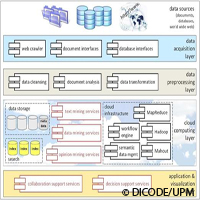EU project to smooth the path through data-intensive environments
Scientists in Europe are working hard at strengthening cooperation and decision-making data-intensive and cognitively complex settings by advancing information systems. Helping fuel this technology drive is a new EU-funded project that is exploiting and building high-performance computing paradigms and broad data processing technologies, such as cloud computing and column databases, to search, assess and aggregate data in varied, extensive and evolving sources. DICODE ('Mastering data-intensive collaboration and decision making') is supported under the 'Information and communication technologies' (ICT) Theme of the EU's Seventh Framework Programme (FP7) to the tune of EUR 2.6 million. Coordinated by the Research Academic Computer Technology Institute in Patras, Greece, the DICODE project ultimately aims to integrate the reasoning capacities of man and machine. Experts say that cooperation and decision-making settings are generally linked to massive amounts of multiple data types that have a low signal-to-noise ratio. Various sources are used to gather these data, which are not only different in terms of subjectivity and importance, but are characterised by people's opinions, practices, indisputable measurements and scientific results. According to the eight-strong team, data types can be of varied levels as far as human understanding and machine interpretation are concerned. Nowadays, large volumes of data are added to databases with as few problems as possible. Throbbing headaches result when people attempt to consider and use data gathered over longer periods of time, and analyse them to help in their decision making. The DICODE partners say more complex situations require the identification, understanding and use of data patterns. Large volumes of data must be aggregated from multiple sources, and then mined for insights that would not materialise from manual inspection or analysis of any single data source, according to the team. DICODE is set to provide solutions with its technological advances. The consortium is developing and consolidating services to be released under an open source licence. The partners characterise the DICODE solution as an innovative workbench incorporating and coordinating a set of interoperable services that ease the data-intensiveness and complexity overload at critical decision points to bring them down to a manageable level. At the end of the day, stakeholders will benefit immensely, as their production and creativity levels will rise. The DICODE partners point out that the project's success will be validated through three use cases, which will test the transferability of DICODE solutions in diverse cooperation and decision-making settings. The consortium consists of experts from Biomedical Research Foundation in Greece; Neofonie GmbH, Publicis Frankfurt GmbH and the Fraunhofer Society for the Advancement of Applied Research (FHG) in Germany; the University of Leeds and Image Analysis Limited in the UK; and Spain's Universidad Politécnica de Madrid (UPM). In a statement, the UPM's Biodemical Informatics Group said its role in DICODE is to integrate services, tools and project resources. The Spanish team is also helping develop the new tools and services for the project platform. Kicked off in 2010, the DICODE project is set to end in 2013.For more information, please visit: DICODE:http://dicode-project.eu/Universidad Politécnica de Madrid (UPM):http://www.upm.es/internacionalResearch Academic Computer Technology Institute:http://www.cti.gr/FP7 ICT:http://cordis.europa.eu/fp7/ict/
Countries
Germany, Greece, Spain, United Kingdom

